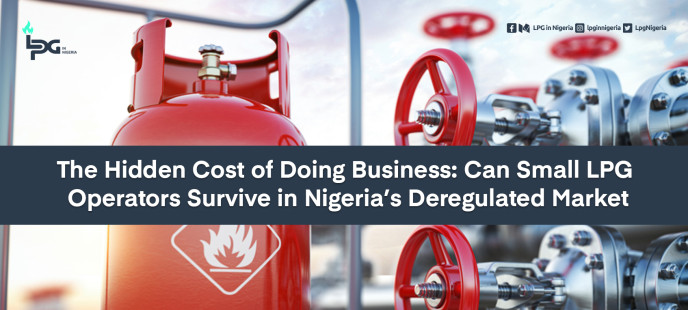- 2579
- 2
Sharing Ideas and Updates on LPG in Nigeria and related information to enable effective collaboration within the LPG Value Chain
The Hidden Cost Of Doing Business: Can Small LPG Operators Survive In Nigeria’s Deregulated Market?

As Nigeria’s LPG sector continues its rapid expansion, small and mid-sized operators are sounding the alarm over dwindling margins, stiff competition, and insufficient regulatory oversight. In conversations within the LPG in Nigeria WhatsApp community, the frustration is palpable: “I sell gas, I can't even pay my bills after all the stress 7 days a week… It is so bad.”
For many, the dream of owning a gas plant has turned into a survival struggle. Several dealers shared that they now take up to six weeks to sell a 10-tonne truck of gas, barely breaking even after factoring in diesel, maintenance, staffing, and other operational costs. A dealer lamented: “Maintenance of the machine wan kill person… After everything, I dey see ₦250,000 profit. Na like this I wan take buy house for Banana Island?”
Why Are Margins Thinning?
Increased Competition from Big Players: Major marketers like RainOil and AA Rano are setting up retail stations close to smaller dealers, often selling below market price. One user described the reality: “Imagine buying gas at ₦1,000 and selling at ₦1,100, but a depot-owned station near you is selling to end users at ₦900. How do you compete?”
Proliferation of Unlicensed Plants: Dealers express concern over the unchecked rise of unregulated LPG plants. “85% of gas plants and skids in Nigeria are unlicensed and unregulated,” a participant noted. The resulting price wars drive profits down across the board and introduce safety risks that affect the entire ecosystem.
No Price Control or Union Protection: Unlike petrol station owners who have IPMAN and PEDAN backing them, LPG dealers feel unprotected. Many believe that the absence of a strong union or coordinated pricing structure is undermining the entire industry. “Here on the street, it is war and survival of the fittest,” one dealer observed.
Can Small Operators Still Survive?
Yes, but it demands adaptability and innovation:
Embrace Niche Markets: Operators can carve out new revenue streams by focusing on underserved areas like residential delivery, mobile refills, and home installations.
Operational Efficiency: Cutting down waste, using digital management systems, and improving staff training can help operators retain more profit.
Customer Loyalty Programs: Offering discounts, referral bonuses, or free safety checks can help build a loyal customer base.
What Needs to Change?
For long-term survival, stakeholders agree that Nigeria’s LPG industry needs stronger regulation, enforcement of safety standards, and a clear framework for licensing and operations. Moreover, government support in the form of subsidies or grants for small operators can help level the playing field.
In the words of one contributor, “Gas is not like POS business. It needs control. If not, by next year, most of us will look for alternative businesses.”
The writing is on the wall—but there’s still time to act.
















DD
18 June 2025 - 08:37amThe coming of Dangote into LPG has been a boost to many private owned depots. They offer a reduced price which enables private owned plants to operate on better gains. However, the major headache are those unlicensed skids. 2.5MT, 3MT and some 5MT skids that do not meet the standard of NMDPRA but are still existing. Being smaller, they are closer to the populace. The private owners that want license are being forced into buying two plots to conform with industry standards while you will see unlicensed ones on less than half a plot competing with those that have struggled to raise huge capital to do the business. It does not encourage people to do the right thing. A pricing structure and union would help too.
Reply